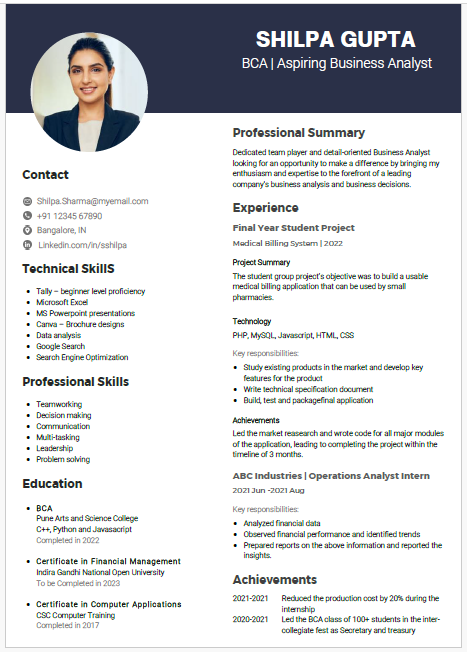Aspiring Business Analyst
• BCA

About this template
Resume is often the first impression you make on potential employers.
This is a well-designed resume template can help you stand out from the competition and showcase your qualifications in a clear, professional manner.
Some useful and important technical skills for BCA Aspiring Business Analyst
For BCA graduates aspiring to become Business Analysts, developing a diverse set of technical skills is crucial to effectively analyze business processes and data. Here are ten important technical skills :
1. Data Analysis and Visualization
Proficiency in data analysis tools like Microsoft Excel, SQL, and visualization software such as Tableau and Power BI is essential for interpreting data, identifying trends, and presenting insights in an understandable format.
2. Database Management
Understanding database management systems like MySQL, Oracle, and SQL Server helps in managing and retrieving data efficiently, ensuring data integrity and accessibility for analysis.
3. Programming Languages
Knowledge of programming languages such as Python and R is beneficial for performing advanced data analysis, automating tasks, and developing custom solutions for complex problems.
4. Requirements Gathering and Analysis
Skills in eliciting, documenting, and analyzing business requirements using techniques like interviews, surveys, and workshops are critical for understanding stakeholders’ needs and translating them into functional specifications.
5. Business Process Modeling
Familiarity with business process modeling tools such as BPMN (Business Process Model and Notation) and software like Lucidchart or Microsoft Visio helps in visualizing and improving business processes.
6. Project Management Tools
Proficiency in project management software like JIRA, Trello, and Microsoft Project is important for planning, tracking, and managing project activities, ensuring timely and successful project delivery.
7. Statistical Analysis
Understanding statistical methods and tools, such as SPSS or SAS, allows for in-depth data analysis, hypothesis testing, and deriving meaningful conclusions from data sets.
8. Agile Methodologies
Knowledge of Agile principles and practices, including frameworks like Scrum and Kanban, helps in managing projects dynamically and ensuring continuous delivery of valuable products.
9. CRM and ERP Systems
Experience with Customer Relationship Management (CRM) systems like Salesforce and Enterprise Resource Planning (ERP) systems like SAP allows for efficient management of business processes and customer data.
10. Business Intelligence (BI)
Familiarity with BI tools and platforms, such as QlikView and Microsoft Power BI, is crucial for creating dashboards, generating reports, and making data-driven business decisions.